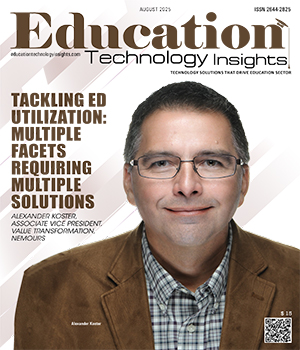THANK YOU FOR SUBSCRIBING
Be first to read the latest tech news, Industry Leader's Insights, and CIO interviews of medium and large enterprises exclusively from Education Technology Insights
Building AI Literacy, One Campus at a Time
Melanie Hibbert, Director of Academic Technologies and Sloate Media Center, Barnard College
 Melanie Hibbert, Director of Academic Technologies and Sloate Media Center, Barnard College
Melanie Hibbert, Director of Academic Technologies and Sloate Media Center, Barnard CollegeMy first job out of college was an Alaska Teaching Fellow in Nulato, Alaska. I worked in a school in a Koyukon-Athabascan native village on the Yukon River, only accessible by airplane. I was one of three high school teachers and while the experience overall was life-changing, my first year was a bit of a disaster. Before my second year of teaching, our school had a new computer lab installed with scanners and digital cameras and I started incorporating a lot of technology and media and other computer literacy skills into my teaching. While there was still a lot of room for improvement, it was transformative; that is, it was (slightly) less of a disaster and led me to question how technology (and media) can intersect with learning, literacy and education. These questions led me to a doctoral program in education and technology at Columbia University.
For the past ten years, I have been at Barnard College, Columbia University mainly in a Director role, where I have continued working on these themes around technology and media and education. One particularly transformative leadership experience was leading the overnight shift to remote learning during COVID-19 in March 2020 at my institution. It is one example (of a few) I have been through where there is no playbook; you just have to do it and figure things out along the way, have resilience and collaborate with people and other departments. I think humility is very important as a leader, as well as adaptability and maintaining a sense of humor. I believe management is a service role - you are there to support and mentor your team. The COVID time also taught me the necessities of work-life balance and how to manage time effectively and practice self-care like exercise, because otherwise you will burnout.
AI Literacy Framework Elevates Campus Learning
Artificial intelligence is a big deal, in my opinion. There may be over-hype, but I do think it is possibly on the same scale as the Industrial Revolution. At Barnard, my colleagues and I started approaching AI with different approaches and at different levels, starting in 2023 – workshops, open labs, events, etc. It became clear that we needed a broader way to think about AI literacy efforts, which became an Educause article we co-authored in 2024, “A Framework for AI Literacy”. This framework is based on Bloom’s Taxonomy and is a pyramid that conceptualizes AI literacy in different levels. The first level is based on definitional and foundational ideas of AI and the top level is around building and creating AI. While I would say that our primary focus is on the first level of the pyramid, Barnard is doing things at all levels.
“Curiosity is key — learning, reading, testing and trying out new tools and remaining engaged in the field”
I believe AI Literacy is very important for everyone in higher education, but I also believe that a component of AI literacy can mean deciding not to use it. Academic freedom is tantamount; and Barnard faculty can decide to allow (or embrace) the use of AI in their courses, or they can decide that it is banned. This is their decision. I also think that AI detection software is not a reliable or effective way to police AI use, so this is not technology we deploy.
Challenges Demand Quality with Fewer Resources
Higher education is facing many headwinds at once - there are external political pressures and there are increasing costs Wfor so many things. I am fortunate to work at an excellent institution where there are many more applicants than there are admission slots available; but many colleges are facing enrollment declines and the demographic cliff. I think we are all strategizing around ways to maintain quality services and programs in an environment where there may be fewer resources.
Leading EdTech through Disruption, Discovery and Curiosity
I think there will be some innovative AI tools that will emerge in the next 5-10 years. For example, custom LLMs that are easy to build, created from specific data sets, like course materials, or a research corpus. This could create custom chatbots for instructors and students to engage with materials or assist with research, cutting down on hallucinations. I think AI-generated media - video in particular - will greatly improve and I imagine that will impact how we teach and think about media production.
I think adaptability is so important (including flexibility and resilience), because especially in the technology sectors, it is always going to be changing. Software, tools, approaches— it is not static. There is also larger forces and events that happen that (at least I) could not have predicted, such as COVID-19 and the rise of AI. The changes in ed-tech make it exciting, but it does mean you have to always be learning. Curiosity is key - learning, reading, testing and trying out new tools and remaining engaged in the field.
Read Also
Rewiring Stem Education for the Future
Redefining Student Engagement: Fostering Sustainable, Redemptive and Accountable Excellence For Holistic Student Growth
The Ripple Effect of Investing in Staff Development
Mental Health as a Foundation for Student Success
Balancing Innovation with Inclusivity to Transform Digital Learning Experiences
Building a Culture of Continuous Professional Learning

I agree We use cookies on this website to enhance your user experience. By clicking any link on this page you are giving your consent for us to set cookies. More info

However, if you would like to share the information in this article, you may use the link below:
www.educationtechnologyinsightseurope.com/cxoinsights/melanie-hibbert-nid-3415.html





















